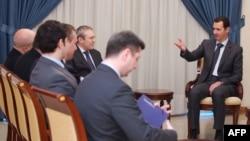Iran is increasingly focusing its military efforts in the Mideast on Iraq and the loser appears to be Syrian President Bashar al-Assad. For the past few weeks his forces have been losing ground to the country’s fractious rebels, who despite being engulfed by infighting, have managed to seize territory in the war-torn country’s north and south, say analysts.
Earlier this year Assad’s forces were menacing the rebels in districts they hold in the northern Syrian town of Aleppo and threatening an encirclement that would have severed insurgent supply lines to Turkey. With the encirclement just a handful of miles from being completed, Assad boasted that 2015 would see his victory over the rebels in a civil war that has cost at least 200,000 lives.
But in March, rebel units disrupted an effort by Syrian government forces to surround them and captured a strategic crossroads and a commanding hill controlling a key route into Aleppo. Later in the month insurgents, with al-Qaida’s affiliate Jabhat al-Nusra in the lead, captured Idlib, the second biggest town to fall into rebel hands in the brutal four-year-long civil war.
Rebel commanders and analysts say Assad’s forces appeared over-stretched in Idlib. Noticeably absent in the defense of the city in the country’s northwest were Iranian-coordinated foreign Shiite militiamen and Lebanese Hezbollah fighters, who the Assad regime has relied on for past gains as well as to organize local fighters from Assad’s minority Alawi sect, an offshoot of Shia Islam.
Many Shia militiamen from Iraq who had been fighting alongside Assad’s forces started to return last autumn to neighboring Iraq to assist in the pushback against the Sunni militants of the so-called Islamic State, also known as ISIL, who seized a swath of western and northern Iraq in the summer. Top Iranian commanders from Iran’s Revolutionary Guards, including the commander of its Quds Force Qasem Soleimani, who were frequently in Syria to help direct military tactics are now more often in Iraq, say Baghdad-based Western diplomats.
“The apparent collapse of government defenses in Idlib has punched a gaping hole in the government's narrative of approaching victory and boosted the opposition politically, as well as militarily, spelling trouble for Bashar Assad,” according to an analysis by Syria expert Aron Lund in an article published on the Syria Comment blog.
Other towns to have fallen to the rebels recently include Bosra in the south. Insurgents this month seized the Nasib border post on the frontier with Jordan in Deraa province, forcing its closure by Jordanian authorities after looters from nearby Syrian villages swarmed the free zone straddling the two countries’ border to grab food, computers and about 350 new cars.
Assad’s army is now facing a serious threat just five miles from Damascus, where IS militants have captured about 90 percent of the Yarmouk Palestinian refugee camp, triggering a humanitarian crisis.
Only towards the border with Israel are Syrian forces recording successes, where bolstered by fighters from Lebanon’s radical Shia movement Hezbollah they have managed to seize a string of towns, inching closer to the Israeli-occupied Golan Heights.
“Regime troops and their Hezbollah-led allies are advancing in the area linking Daraa, Quneitra and Damascus,” according to the Syrian Observatory for Human Rights, a London-based pro-opposition group that relies on information from political activists.
Disputes among Assad’s top generals appear to be escalating, too, according to local media reports. And the Syrian army may be suffering a shortage of manpower. It is wary of conscripting or relying on Sunni Muslims and is resorting to “press gangs” to raid Alawi villages to find new recruits. More than 20,000 Alawite soldiers and militiamen were killed last year, according to the Syrian Observatory, about a tenth of fighting-age men from the sect.
The successive loses Assad forces have suffered in recent weeks is also testimony to better coordination between rebel brigades and increasing consolidation of insurgent militias, say analysts. The final push on Idlib involved just under 5,000 fighters drawn mainly from al Nusra and hardline Islamist brigades Ahrar al-Sham and Jund al-Aqsa. Rebel commanders say they used weaponry they captured recently from two Western-backed moderate brigades as well as a new influx of arms funded by Gulf countries.
But infighting continues among the insurgents - especially between the IS and jihadist rivals in al Nusra and Islamist brigades. In Yarmouk all rebel groups have been fighting the Islamic State.
Car bombings targeting two rebel bases that killed and wounded dozens Tuesday north of Aleppo are being blamed by rebel commanders and local activists on the Islamic State. The insurgents’ Aleppo Media Center said the first blast in the town of Marea killed 12 and wounded more than 15. The second blast in the Hur Kilis district claimed 30 casualties, the center claimed. Two rebel leaders were among the dead.




